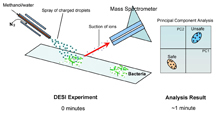Technique quickly identifies bacteria for food safety, health care and homeland security
2007-01-22
December 28, 2006
WEST LAFAYETTE, Ind. — Researchers at Purdue University have used a new technique to rapidly detect and precisely identify bacteria, including dangerous E. coli, without time-consuming treatments usually required.
The technique, called desorption electrospray ionization, or DESI, could be used to create a new class of fast, accurate detectors for applications ranging from food safety to homeland security, said R. Graham Cooks, the Henry Bohn Hass Distinguished Professor of Chemistry in Purdue's College of Science.
Using a mass spectrometer to analyze bacteria and other microorganisms ordinarily takes several hours and requires that samples be specially treated and prepared in a lengthy series of steps. DESI eliminates the pretreatment steps, enabling researchers to take "fingerprints" of bacteria in less than a minute using a mass spectrometer.
"This is the first time we've been able to chemically analyze and accurately identify the type of bacteria using a mass spectrometer without any prior pretreatment within a matter of seconds," Cooks said.
New findings show how the Purdue researchers used the method to detect living, untreated bacteria, including E. coli and Salmonella typhimurium, both of which cause potentially fatal infections in humans.
"There is always an advantage to the analysis of living systems because the bacteria retain their original properties," Cooks said.
The findings are detailed in a paper appearing Jan. 7 in the journal Chemical Communications. The paper was written by chemistry graduate students Yishu Song, Nari Talaty and Zhengzheng Pan; Andy W. Tao, an assistant professor of biochemistry; and Cooks.
Mass spectrometry works by turning molecules into ions, or electrically charged versions of themselves, inside the instrument's vacuum chamber. Once ionized, the molecules can be more easily manipulated, detected and analyzed based on their masses. The key DESI innovation is performing the ionization step in the air or directly on surfaces outside of the mass spectrometer's vacuum chamber. When combined with portable mass spectrometers also under development at Purdue, DESI promises to provide a new class of compact detectors.
Purdue researchers are focusing on three potential applications for detecting and identifying pathogens: food safety, medical analysis and homeland security. Such a detector
